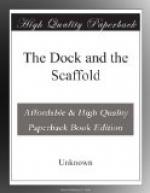THE CHIEF BARON—I
must again tell you that you are not at
liberty to do that.
PRISONER—I propose
to answer briefly the question why the
sentence of the court should
not be pronounced upon me. Do I
understand you to refuse me
that privilege?
THE CHIEF BARON—Certainly not; but I am bound in point of law to refuse to hear you upon any matter respecting the verdict. We are bound by that verdict just as much as you are. That is the law.
PRISONER—What position do I stand in now, my lord? I have been indicted with a number of parties, one of whom had been identified in America. I have been tried and convicted. What position do I stand in now? Am I convicted on the evidence of Corydon, who swears that I belonged to the Fenian Brotherhood in 1863? Does that prove that I belonged to it in 1867?
The Chief Baron then explained that what he left to the jury was, that if they believed upon the evidence that on the 5th of March the prisoner belonged to the Fenian confederacy, having for its object the deposition of the Queen, he would be answerable for the acts done by his confederates, whether he was present or absent at the time.
PRISONER—You instructed the jury, at the same time, that the fact of my holding the position of a colonel in ’63 was sufficient corroboration of the evidence that I belonged to it in 1867.
THE CHIEF BARON—I told the jury that holding the rank of colonel was evidence for their consideration, upon which to determine whether you previously belonged to the Fenian confederacy. I told them they were at liberty to consider whether you would have got that rank if you then joined for the first time.
PRISONER—Precisely the same thing, but in different phraseology. Am I to understand that I have not liberty to address the court as to why sentence should not be pronounced upon me?
THE CHIEF BARON—You
are not so to consider. You are at
liberty to address the court,
but you are not at liberty to
comment upon the evidence
to show that the verdict was wrong.
PRISONER—What can
I speak on? To what can I speak, if not to
something connected with my
case? I am not here to refer to a
church matter or any political
question.
THE CHIEF BARON—I
have informed you what we are bound to
rule.
PRISONER—Then I state, my lord, that as an American citizen, I protest against the whole jurisdiction of this court, from the commencement of my arraignment down to the end of my trial. I protest against being brought here forcibly, and against my being convicted on the evidence of a man whom you yourselves designated a man of the most odious character. You instructed the jury pointedly on one occasion, and subsequently you said that no respectable jury could act on his




